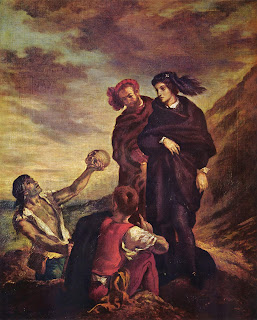There Should be a Name for it but not This One, says Griselda Heppel

Alas, poor Yorick! from Hamlet. By Eugène Delacroix - The Yorck Project (2002) 10.000 Meisterwerke der Malerei (DVD-ROM), distributed by DIRECTMEDIA Publishing GmbH. ISBN: 3936122202., Public Domain, https://commons.wikimedia.org/w/index.php? curid=150167 Now here’s something I never expected. I knew there had to be a word for a false collective memory of a line in a film or play, famously always slightly misquoted because it sounds right. ‘Alas, poor Yorick, I knew him well,’ for instance, instead of what Shakespeare actually made Hamlet say, which was ‘Alas, poor Yorick! I knew him, Horatio.’ Humphrey Bogart and Ingrid Bergman in Casablanca By Trailer screenshot - Casablanca trailer, Public Domain, https://commons.wikimedia.org/ w/index.php?curid=1757187 Or, ‘Play it again, Sam,’ which feels much more prosaic than the haunting, ‘Play it, Sam, play it,’ from a dewy-eyed Ingrid Bergman in Casablanca . So anyway, I googled the phenomenon, of course I did, and you’ll never gue...



